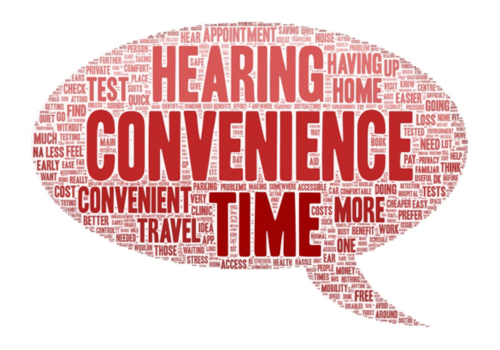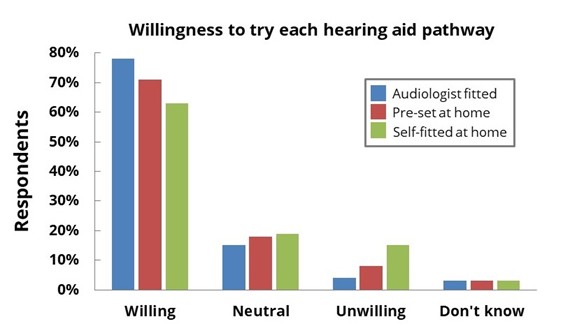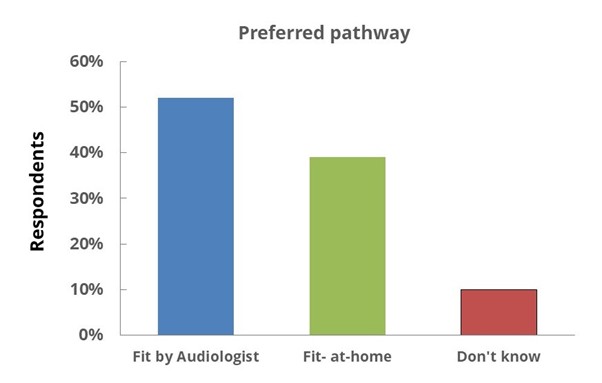Compelling evidence that UK adults are interested in conducting home hearing tests and trying NHS-provided fit-at-home hearing aids
What we know
One of the first actions taken by Wes Streeting when he was appointed Secretary of State for Health and Social Care in July 2024, was to commission a rapid independent investigation of the NHS in England. The outcome was the Darzi report, published in September 2024 (Darzi, 2024). For many, the findings of the report make for uncomfortable reading. The NHS is in serious trouble with patients struggling to access services and treatment that is variable in quality. As a result, public satisfaction is low and while staff are doing their very best to cope with the enormous challenges, goodwill is finite, and willpower is waning. Hearing professionals, being subject to the same pressures as the rest of the NHS, are also suffering.
Darzi proposed a number of solutions for the NHS including shifting care closer to home and introducing innovative care pathways. This is consistent with the government’s 10-year NHS plan for England (DHSC, 2024) and also the recent DHSC policy paper on the potential of wearable technology specific to hearing aids (DHSC, 2025).
What we don’t know
Public opinion about these proposals is important because it has the potential to change the way the public must engage with hearing care. However, opinions as they pertain to the proposed changes to hearing care are largely unknown. If such changes are to be made, it is critical to know what proportion of UK adults would:
- Be willing to conduct a home-based hearing assessment that was recommended by the NHS
- Be willing to try home-based pre-set and/or self-fit NHS hearing aids
- Prefer audiologist-fit or home-fit (prefit or self-fit) hearing aids
What we did
To answer the questions above, we conducted a survey with a nationally representative sample (age, gender and education level, region, and social grade/socio-economic group) of more than 2000 adults living in the UK. These individuals were randomly selected from members of the YouGov Plc UK panel. Our survey questions were incorporated into the daily omnibus YouGov survey on 27-28 March 2025.
What we found
We are currently analysing the data in detail for a peer-reviewed journal (Munro et al, In preparation) but here are the headline findings:
- Around 65% of UK adults would be willing to conduct an NHS approved hearing test at home. Some 63% would trust the results (although 50% by “Only a little”) if they themselves took a hearing test at home.

- The most common benefit was reported as convenience (e.g., no waiting time for an appointment and no need to travel). Perceived problems were concerns over accuracy and reliability.

- At least 65% of UK adults who feel willing/neutral about getting a hearing aid if needed would be willing to try each of the three proposed NHS pathways, with less than 10% being unwilling to try any of them.

- But, if provided with a choice, 52% of those willing to have a hearing aid if needed would choose to see an audiologist for a hearing aid fitting and 38% a fit-at-home hearing aid (27% would choose to have the NHS send them pre-set hearing aids and 12% would choose to have the NHS send them self-fit devices).

What we concluded
The findings provide compelling evidence that adults in the UK are willing to self-test their hearing at home and to try NHS-provided fit-at-home hearing aids. This is also compelling evidence that NHS Adult Hearing Services should evaluate such care pathways because: (i) this has the potential to shift care closer to home, and (ii) provide innovative pathways that are popular with the public.
Of course, it is necessary to evaluate outcomes (e.g., adherence and benefit) and processes (e.g., need for support) with such pathways, and to determine if, based on patient choice, they are effective and efficient. However, this would represent a positive response to the urgent challenges facing NHS Adult Hearing Services.
Authors: Kevin J Munro & Gabrielle H Saunders, Manchester Centre for Audiology and deafness, and NIHR Manchester Biomedical Research Centre
Acknowledgements
Supported by NIHR Manchester Biomedical Research Centre (BRC; NIHR2033080) and NIHR Senior investigator award to Munro. The views expressed are those of the author(s) and not necessarily those of the NIHR or the Department of Health and Social Care.
References
Darzi, A. (2024). Independent Investigation of the National Health Service in England. Published by GOV.UK. https://www.gov.uk/government/publications/independent-investigation-of-the-nhs-in-england (Accessed 1 April 2025).
DHSC (2024). Change NHS: help build a health service fit for the future. https://www.gov.uk/government/publications/change-nhs-help-build-a-health-service-fit-for-the-future (Assessed 1 April 2025)
DHSC (2025). Hearing aids in the UK – policy statement. https://www.gov.uk/government/publications/hearing-aids-in-the-uk/hearing-aids-in-the-uk-policy-statement (assessed 1 April 2025).
Munro KJ, Rhodes S, Saunders GH. Compelling evidence that UK adults are interested in conducting home hearing tests and trying NHS-provided fit-at-home hearing aids. Inter J Audiol (In Preparation).
